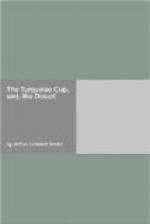“‘Bobby,’ she said, ’I believe I’ve landed you. I know you ’re a fortune-hunter, but what blame? I dare say I should be one, but for the beer. I’m throwing myself away. With my fortune and my figure I think I could get a duke, an elderly duke, perhaps, and a little over on his knees, but still a duke. A well-brought-up young woman would take the duke, but I am nothing but a wild Irish girl. Bobby, you are jolly and wholesome, and auntie likes you, and I’ll take you—hold hard,’ she said, as I moved up—’I’ll take you, if you’ll give me the turquoise cup.’ ‘What’s that?’ I asked. ‘The turquoise cup,’ she said; ’the one in the treasury of St. Mark’s. Give me that and Nora Daly is yours.’ ’All right,’ I said, ‘I’ll trot off and buy it.’
“Here I am, your grace, an impecunious but determined man. I have four thousand pounds at Coutts’s, all I have in the world; will it lift the cup?”
The cardinal rubbed his white hands together, uncrossed and recrossed his legs, struck the arm of his chair, and burst into a laugh so merry and so prolonged that the earl, perforce, joined him.
“It’s funny,” said the latter, finally, “but, all the same, it’s serious.”
“Oh, Love!” exclaimed the cardinal; “you little naked boy with wings and a bow! You give us more trouble than all the rest of the heathen deities combined—you fly about so—you appear in such strange places—you compel mortals to do such remarkable things—you debauch my pigeons, and, when the ill is done, you send your victims to me, or another priest, and ask for absolution, so that they may begin all over again.”
“Do I get the cup?” asked the earl, with some impatience.
“My lord,” said the cardinal, “if the cup were mine, I have a fancy that I would give it to you, with my blessing and my best wishes; but when you ask me to sell it to you, it is as though you asked your queen to sell you the Kohinoor. She dare not, if she could. She could not, if she dare. Both the diamond and the cup were, doubtless, stolen. The diamond was taken in this century; the cup was looted so long ago that no one knows. A sad attribute of crime is that time softens it. There is a mental statute of limitations that converts possession into ownership. ‘We stole the Kohinoor so long ago,’ says the Englishman, ’that we own it now.’ So it is with the cup. Where did it come from? It is doubtless Byzantine, but where did its maker live; in Byzantium or here, in Venice? We used to kidnap Oriental artists in the good old days when art was a religion. This cup was made by one whom God befriended; by a brain steeped in the love of the beautiful; by a hand so cunning that when it died art languished; by a power so compelling that the treasuries of the world were opened to it. Its bowl is a turquoise, the size and shape of an ostrich’s egg, sawn through its longer diameter, and resting on its side. Four gold arms clasp the bowl and meet under it.




